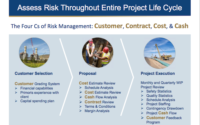Primoris Services Corp., whose bread and butter has been pipeline and electric grid work, now sees some of its fastest growth in solar and other renewable energy products.
The company has racked up a $1 billion backlog in solar projects, with a growing portfolio of other renewable work as well, CEO Tom McCormick recently told analysts.
“The Biden administration is ready to pursue renewable energy on a large scale” and "this dovetails with our increasing activity in the renewable energy markets."
– Tom McCormick, CEO, Primoris Services Corp.
That’s up dramatically over the last two years, when Primoris earned $45 million in revenue in 2018 from renewable energy projects, he told analysts. The Dallas-based company sees more opportunity for growth in the sector under a more green-friendly administration in Washington, D.C. “The Biden administration is ready to pursue renewable energy on a large scale,” McCormick said, adding that “this dovetails with our increasing activity in the renewable energy markets.”
Primoris’ (PRIM: NASDAQ) finished 2020 with a record $3.5 billion in revenue, for a 12% increase over the previous year. Net income surged 28% in 2020, hitting $105 million.
“The numbers paint a clear picture of the success of our strategy even in a difficult market,” McCormick said in a statement.
Primoris’ mainstay pipeline and underground unit reported the company''s largest increase in revenue, topping $900 million, up more than 77%. The company also performs industrial and heavy civil construction contracts and is getting started in telecommunications, too, as it diversifies.
Pipeline projects in Texas provided a big boost. “Our field services were able to produce strong results for the year despite the challenges encountered with the drop in the price of oil, as well as the pandemic and hurricanes that struck the Gulf Coast last year,” he said.
But major new solar projects helped drive up revenue in Primoris’ power, industrial and engineering segment by more than 9%, McCormick said.
The company began work in the fourth quarter on a 380-MW solar project in Nevada, while landing the job as the EPC contractor for a pair of Texas solar projects that will bring 885-MW of electricity to the market. That job is set to begin in the first quarter of 2021, according to McCormick.
Out on the Gulf Coast, Primoris also wrapped up “Phase IV engineering services” on a $50 million green diesel project, he said.
The company is also retrofitting a West Coast refinery for biofuels, a $200 million-plus project.
Wind, Too? Only Limited Scopes
Primoris is also weighing whether to get into the wind energy market as well, “but only for specific scopes,” McCormick said.
The company won’t invest n a large crane to “set turbines and fan blades,” but could provide other services such as “site clearing and grading, construct roads” and “complete underground installations, including the foundation work and duct banks,” he said.
Other possibilities include pulling or terminating cables and building transmission lines to and from wind farms. “There is a lot of opportunity there,” McCormick said.
While building solar installations is a different construction process than rolling out a pipeline, both involve fixed price projects, McCormick told analysts. Those projects have “low double-digit” profit margins of 14% to 15%, said Kenneth Dodgen, Primoris’ chief financial officer.
Solar projects can also lead to “cross-selling opportunities” for other Primoris units, he told the Wall Street analysts.
Primoris’ utility unit can build out the transmission lines and substations needed to support new solar complexes, while its civil construction team can do site prep and build access roads.
“On a typical solar project, we have hit as many as four Primoris business units doing some level of work on that project,” McCormick said.
In addition to its increasing focus on the renewable energy sector, Primoris is also moving into telecom infrastructure work.
Primoris, which had made a series of buyouts of smaller companies that dramatically increased its revenue from 2014 to 2017, has slowed but not stopped its acquisition pace.
In December, Primoris unveiled a $620 million, all-cash purchase of Future Infrastructure Holdings, which does maintenance, repair, upgrades and installations in the telecom and gas sectors.
McCormick told analysts that integration of the new company into Primoris is proceeding, with cost-cutting efforts stemming from overlap between the two firms expected to yield $10 million over a two year period.
The move into telecom should provide entry to a field with higher profit margins than pure engineering and construction, he noted.
“Telecom services is a high growth market that will continue to grow well into the future, riding the tailwinds of our increasingly digital world.” McCormick said.






Post a comment to this article
Report Abusive Comment